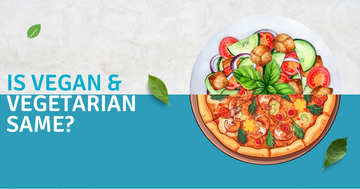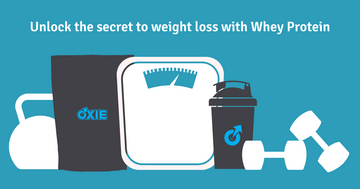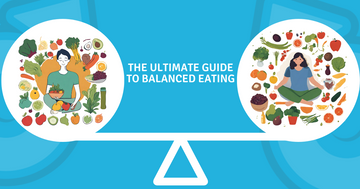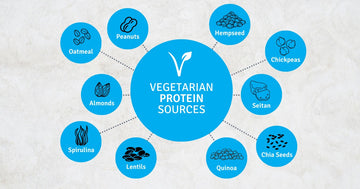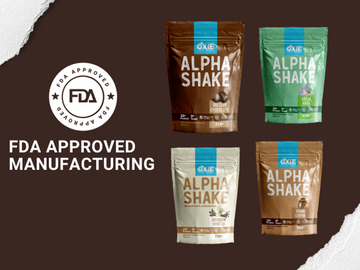As people become more conscious about their health and the environment, many are turning to plant-based diets. Two popular options are veganism and vegetarianism. While these diets share some similarities, there are also key differences between them that affect both diet and lifestyle.
Are you a vegetarian or vegan?
Please allow us to assist you in recognising the differences between the two and to shed some light on the subject through this article. Hope you will find all your answers at the end for sure.
WHAT IS VEGAN?
Veganism is a lifestyle and dietary choice that involves avoiding the use of animal products or by- products, such as meat, dairy, eggs, honey, and leather. Vegans typically adopt this lifestyle for ethical, environmental, and/or health reasons.
Fruits, grains, nuts, legumes, seeds, and vegetables are just a few examples of the wonderful and nutrient-dense foods that may and should be included in a vegan diet. Anything made of wool, silk, or leather is not worn by vegans. Many consumers refuse to use or buy products that have been filtered with animal parts or that have undergone animal testing (such some wines, beers, and white sugars). A vegan diet's main components are fruits, vegetables, grains, nuts, and other plant-based goods.
VEGAN FOODS
- Legumes
- Seeds, nuts, and nut butters
- Chia, hemp, and flax seeds
- Tofu and other processed meat alternatives
- Plant-based milks and yoghurts with added calcium
- Algae
- Yeast, nutritional
- Fermented and sprouted plant products
WHO ARE VEGETARIANS?
One who abstains from eating meat: a person whose diet is exclusively
composed of fruits, vegetables, grains, nuts, and occasionally eggs or dairy products. The practice of not eating meat is known as vegetarianism (red meat, poultry, seafood, insects, and the flesh of any other animal). It might also mean avoiding eating any leftovers from animal slaughter.
There are several reasons to embrace a vegetarian diet. Due to their respect for sentient animal life, many people refrain from eating meat. Such moral considerations
have been formalised in a number of religious doctrines and in support of animal rights. Other reasons to become a vegetarian include those relating to one's health, politics, the environment, culture, aesthetics, economy, taste, or other personal preferences.
VEGETARIAN DIET:
A vegetarian diet is one that emphasises plant-based foods such fruits, vegetables, legumes, whole grains, seeds, and nuts. It eliminates all previously slaughtered animal- like flesh, such as pig, beef, poultry, fish, insects, and animal proteins like rennet or gelatine as well as animal-derived lipids.
However, some vegetarian diets allow the use of animal products that don't need the killing or suffering of animals, such as milk, honey, and eggs.
Overall, vegetarianism is a dietary choice that involves excluding certain types of animal products and instead focusing on plant-based foods.
People choose to follow a vegetarian diet for various reasons, such as health concerns, environmental concerns, or ethical reasons related to animal welfare. Studies have shown that a well-planned vegetarian diet can be nutritionally adequate and may have health benefits such as reducing the risk of chronic diseases such as heart disease and certain types of cancer.
|
VEGAN |
VEGETARIANS |
|
Vegans avoid all animal products. |
Vegetarians may consume dairy products and eggs |
|
A vegan wouldn't wear wool sweaters, fur coats, down comforters, leather shoes, leather belts, or cosmetics that have been tested on animals |
In addition to a variety of fruits, vegetables, nuts, seeds, grains, and pulses, vegetarians frequently take "meat substitutes" made from these dietary groups. |
|
Any food derived from animals is off-limits to vegans, ➢ Fish ,shellfish like crabs, ➢ clams, and mussels; ➢ Beef, ➢ hog, ➢ lamb, ➢ other types of red meat; Chicken, duck, and other types of fowl; and Eggs ➢ Cheese and butter ➢ Dairy items such as milk, cream, ice cream, and others ➢ Mayonnaise (because it contains egg yolks); |
A vegetarian diet is one that emphasises plant- based foods such fruits, vegetables, legumes, whole grains, seeds, and nuts. It eliminates all previously slaughtered animal-like flesh, such as pig, beef, poultry, fish, insects, and animal proteins like rennet or gelatin as well as animal-derived lipids. |
|
The lists the following potential inadequacies that vegan dieters should be aware of: • Protein • Omega-3 • Fatty acids • Vitamin b12 • Vitamin D |
Vegetarian diets allow the use of animal products that don't need the killing or suffering of animals, such as milk, honey, and eggs. Experts and civilizations divided these diets into numerous categories as more knowledge and research about them became available |
|
Vegans choose not to use palm oil because they think doing so causes habitat degradation and animal suffering. Furthermore, some vegans avoid doing business with or lending support to groups that involve animal testing or otherwise hurt animals. |
Vegetarians avoid consuming any animal products, including meat, poultry, and fish. Vegetarian diet is included with different portions of fruits, vegetables, grains, legumes, nuts, and seeds. Depending on the type of diet you follow, you may or may not include some type of dairy product, honey, or eggs. Simply you have follow diet which are part of soil or our earth. |
|
VEGAN |
VEGETARIANS |
|
Vegans steer clear of using animals in zoos, circuses, aquariums, and other forms of entertainment.Vegans typically uphold stronger moral and ethical standards, and some even support the idea that people and animals should have the same level of protection. |
Some vegetarians may choose to avoid zoos because they do not believe in keeping animals in captivity for human entertainment. They may view zoos as unethical and contrary to the principles of animal welfare. Other vegetarians may not have a problem with visiting zoos, as they believe that some zoos play an important role in wildlife conservation, education, and research. They may view zoos as necessary for protecting endangered species and promoting awareness about animal welfare issues. |
|
Vegan diets typically consist of plant-based meals like: Whole grains like millet, oats, barley, and brown rice Various legumes, dried beans, and peas, such as split peas, black beans, garbanzo beans, and lentils every fruit and vegetable seeds and nuts Authentic soy products including tempeh, tofu, and edamame |
A vegetarian diet abstains from eating meat and other animal products, much as a vegan diet. However, vegetarians are permitted to consume some animal products such as dairy, milk, cheese, eggs, and honey. Vegetarianism is largely a diet, whereas veganism is a way of life. Along with the diet's alleged health benefits, vegetarians frequently have religious or political objectives. |
REASON WHY VEGAN IS DIFFERENT FROM VEGETARIAN
BEING A VEGAN MEANS RESISTING THE FOLLOWING:
- Foods derived from animals include meat, dairy, eggs, fish, shellfish, and honey. Food additives and ingredients derived from animals include gelatine, beeswax, and cochineal.
-
Clothes derived from animal skins include leather, suede, fur, and wool.
-
Clothes derived from animal feathers include down.
-
Products derived from animals include silk.
- Animal uses in zoos, circuses, aquariums, and other settings.
It is significant to remember that referring to oneself as "vegan" implies that they follow this lifestyle. Some people refer to themselves as eating a vegan diet rather than being vegan since they choose to abstain from eating animal products but do not choose to be rigid about other lifestyle decisions.
A vegetarian diet is one that emphasises plant-based foods such fruits, vegetables, legumes, whole grains, seeds, and nuts. It eliminates all previously slaughtered animal like flesh, such as pig, beef, poultry, fish, insects, and animal proteins like rennet or gelatine as well as animal-derived lipids.
However, some vegetarian diets allow the use of animal products that don't need the killing or suffering of animals, such as milk, honey, and eggs.
HOW VEGAN IS DIFFERENT FROM VEGETARIAN
The main difference between veganism and vegetarianism is the extent to which animal products are excluded from the diet. Vegetarians typically exclude meat, fish, and poultry, but may still consume animal-derived products such as dairy, eggs, and honey. Vegans, on the other hand, exclude all animal products, including meat, fish, poultry, dairy, eggs, and honey.
While both diets can be nutritionally complete, vegans may need to pay closer attention to their intake of certain nutrients such as protein, iron, calcium, and vitamin B12, which are typically found in animal products. Vegetarians may have an easier time meeting these nutritional needs since they may still consume dairy and eggs.
WHAT IS VEGAN COMPARED TO VEGETARIAN?
Vegans exclude all animal products, while vegetarians may still consume certain animal-derived products. Additionally, veganism often involves a broader concern for animal welfare that extends beyond diet, while vegetarianism may be more focused on diet alone
Vegan is comparatively same with vegetarian in some of food items. Vegan is completely dependent on food derived from plants excluding animals and Vegetarian are also dependent on food derived from plants but they also include food derived from animals especially dairy and poultry products only.
IS VEGAN SUITABLE FOR VEGETARIAN
Vegan diet is suitable for Vegetarians .The main reason is Vegan does not eat food derived from animals like egg, milk, flash etc. but on the other hand Vegetarian eats food derived from animal’s dairy products and poultry products etc. So suitability all depends on
food .Vegan is very much different from vegetarian in all aspects but Vegetarian can eat food which are part of Vegans diet but on the other hand vegan cannot opt for diet or products of vegetarian. Vegans cannot compromise in any way.
Some products which are derived from Plants like fruits, vegetables, grains and nuts which are part of Vegan diets and can be used by Vegetarian so in conclusion you can consider that Vegan is suitable for Vegetarian but not vice versa.
IS VEGAN ALWAYS VEGETARIAN?
Vegan is not vegetarian but you can call stricter vegetarian who is purely dependent on
food which are excluded or not derived from animal products closer to vegans. Vegans don't use any of the products which are related to animals in any way or form. Vegan eats food derived from plants such as fruits, nuts, grains and vegetables. In conclusion you can say that both
vegetarians and vegans choose not to eat meat and fish. Vegetarian diets may be preferable when it comes to nutrition and health advantages, while vegan diets may have an advantage when it comes to sustainability and animal welfare. Of course, how well vegans and vegetarians plan and follow their diets will determine how well all of this goes.
WHAT IS VEGAN AND NON VEGAN?
VEGAN:
The Vegan Society claims that a small group of vegetarians who split off from the Leicester Vegetarian Society in England to found the Vegan Society created the term "vegan" back in 1944. The first and last letters of "vegetarian" were combined to create the phrase "vegan."
The first vegan definition was created in 1949. Over time, it underwent a small shift to become what it is today. Those who identify as vegans frequently want to eliminate all forms of animal exploitation or cruelty from their lives; including the items of clothing they wear, the cosmetics they use, and the pastimes they engage in. All species have a right to life and freedom, according to ethical vegans. They see all animals as aware creatures who, like people, want to live pain- and suffering-free lives
Because of this, ethical vegans are against murdering an animal so that it can be eaten or used for clothing. Vegans oppose current farming practices that may subject animals to physical and mental stress, such as the small pens or cages that most animals reside in and hardly ever leave between birth and killing.
NON VEGAN:
Humans that use animals for food, clothing, or any other reason are considered non-vegans. What non vegan eats?
In Indian English, the term "non-vegetarian diet" is often used. The non-vegetarian diet of India includes meat, including red meat, chicken, seafood, or any animal's flesh, as well as the occasional egg. The majority of people on earth consume meat and other
animal products. The meat of animals, fish, seafood, or other living things; or the hides, organs, or other by-products of animals, whole eggs as well as egg-based foods like mayonnaise, dairy products including yoghurt, milk, cream, and cheese or white sugar or honey.
SIMILARITIES BETWEEN VEGAN AND VEGETARIANS:
Vegans and vegetarians share some similarities in their dietary choices and beliefs -
Both exclude meat: Vegans and vegetarians avoid meat, including beef, pork, poultry, and other animal flesh.
Both prioritise plant-based foods: Both diets prioritise plant-based foods, such as fruits, vegetables, grains, legumes, nuts, and seeds.
Both may have health benefits: Studies have shown that both vegan and vegetarian diets can have health benefits, such as reducing the risk of chronic diseases such as heart disease and certain types of cancer.
Both may be motivated by ethical concerns: Many vegans and vegetarians are motivated by ethical concerns related to animal welfare, such as reducing animal suffering and promoting humane treatment of animals.
Both can be environmentally conscious: By reducing or eliminating animal products from their diets, both vegans and vegetarians can have a positive impact on the environment by reducing their carbon footprint and preserving natural resources.
Conclusion:
Now question comes in every body’s mind that which one is better Vegan or Non Vegan so you can simply say that vegan diets are linked to a decreased risk of cardiovascular disease than omnivore ones. Even not only cardio but also other diseases related to liver, kidney, brain etc. if you're really worried about your heart health or having difficulties managing your cholesterol levels than reduce your diet of animal products.
For healthy leaving you have to opt for healthy food habits. Ultimately, the decision between veganism and vegetarianism depends on individual preferences and priorities, but both diets can have health and environmental benefits.

